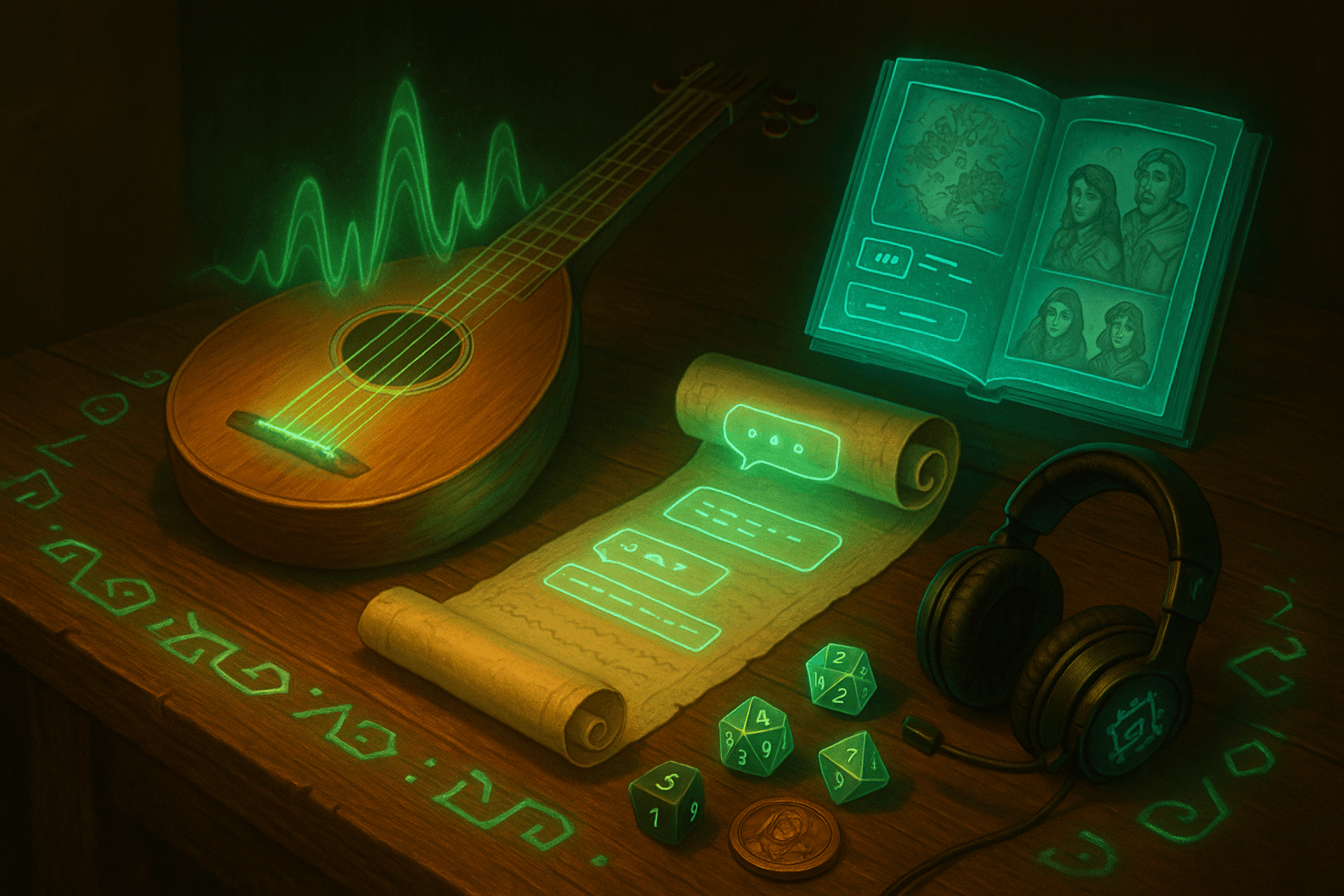AI Tools for TTRPGs
AI tools designed to streamline your TTRPG experience—from prep to play
5/9/25
6 Minutes, 1400 words

Introduction
If you've read our posts on how AI can enhance your TTRPG experience or using AI as a player, you've already seen some of the ways AI can support session prep, recap, character development, and world continuity. But what about the tools themselves?
This post is a quick tour through some of our favorite AI-powered tools for tabletop RPGs—ones we use regularly or recommend to GMs and players looking to bring a little extra magic (and automation) to the table. This list isn't exhaustive, and new tools are emerging all the time. For example, Google's Gemini is gaining popularity with its image generation model and speed, though it's not covered here.
If you want the full GM stack beyond AI, see our best DM tools in 2026 guide.
The tools below represent a solid mix of general-purpose and TTRPG-specific options that can meaningfully enhance your prep, your sessions, and your worldbuilding.
These tools are just one piece of the bigger picture — check out our AI in TTRPGs hub to see how everything connects.
TTRPG AI Assistant
Archivist AI
What it does:
Transcribes sessions, extracts entities (NPCs, locations, factions, items), highlights key moments, generates recaps, and provides a personalized campaign-specific chatbot.
Why it matters:
Archivist is built specifically for TTRPGs. It tracks your world session to session—what happened, who was involved, and why it mattered. Unlike off-the-shelf LLMs that struggle with long histories, Archivist is designed to handle large, evolving campaigns.
Its campaign-aware chatbot lets you ask natural-language questions like: "When did the party first meet the Silver Claw?", "What happened the last time we were in ByRiver?" …and get accurate answers based on your campaign history—not generic fantasy knowledge.
Archivist also keeps your world organized over time, helping you generate consistent summaries, evergreen character bios, and in-world artifacts. Think of it as your assistant GM who never forgets, never misplaces a note, and never burns out.
Author note:
Archivist AI combines many of the features discussed in this blog—transcription, recaps, entity extraction and descriptions, and campaign tracking—into one integrated tool. You can try it free at myarchivist.ai.
Large Language Models
ChatGPT / Claude
What they do: Simulate NPC dialogue, brainstorm plot hooks, flesh out worldbuilding elements, or help you riff when you're stuck. They can also generate session recaps when paired with a transcript—see our section below.
Use them for:
- One-shot or side-quest ideas
- Naming towns, magical items, or factions
- Drafting in-character letters or speeches
- Brainstorming character backstories or villain motivations
They're great for on-the-fly creativity or writing support—but keep in mind: they don't know your campaign unless you tell them. Context is king.
Image Generators
4o Image / Recraft
What they do: Quickly create visual assets—character portraits, location art, handouts, and props—based on prompts or sketches.
Use them for:
- NPC and monster portraits
- Magic item illustrations
- Scrolls, letters, or signs for player handouts
- Custom shop logos or guild banners
Recraft is especially useful for remixing or editing generated images to match your campaign's aesthetic. While these tools aren't ideal for tactical battlemaps, they're perfect for player-facing visuals that enhance immersion—especially in online or hybrid games.
Speech-to-Text Transcription
Deepgram / Whisper
What they do: Convert raw session recordings into clean, readable transcripts.
- Deepgram supports speaker diarization (who said what), which is ideal for multi-player sessions
- Whisper is free when run locally, accurate, and easy to use—but it doesn't tag speakers
Why it matters: A searchable transcript is the foundation for everything from session summaries to AI-powered campaign tracking. Whether you want to pull quotes, analyze player decisions, or just remember what happened last week, having your session in text form makes it vastly easier.
Once you have your transcript, you can feed it into an LLM to generate session recaps, extract key moments, or answer questions about what happened.
Pro tip:
To get a raw recording of your session, you have several options:
- In-person games: Use your phone's microphone or a dedicated voice recorder
- Discord games: Use Craigbot to automatically record your sessions
- Other Online platforms: Enable recording in Zoom, Google Meet, or similar platforms
Many platforms let you download the recording afterward for transcription.
Music Generation
Suno
What it does: Composes original music based on text prompts—from ambient loops to fully structured songs.
Use it for:
- Setting the scene with background music
- Writing bard songs, tavern jingles, or battle chants
- Creating theme music for NPCs, factions, or even locations
- Generating a school fight song or festival anthem
Pro tip:
If you want to generate lyrics first, use a LLM to draft them, then plug them into Suno to bring the music to life.
Final Thoughts
AI tools aren't here to replace your creativity—they're here to support it. Whether you're a GM managing a sprawling world or a player exploring your character's arc, the right tools can reduce friction and make space for better storytelling.
Start small. See what fits your style. Mix and match what works.
Instead of piecing together multiple tools, try Archivist — the AI-powered TTRPG notetaker that works while you play. With a little help behind the scenes, you can spend less time wrangling notes—and more time focused on what really matters: telling great stories with people you care about.
